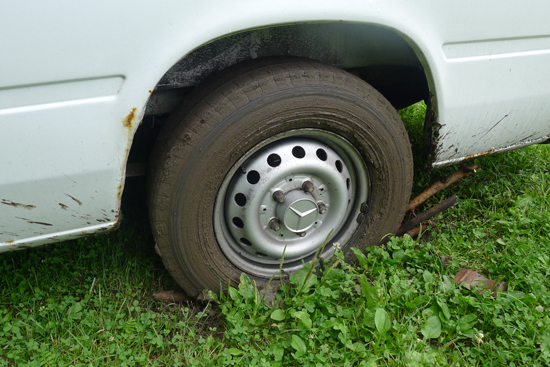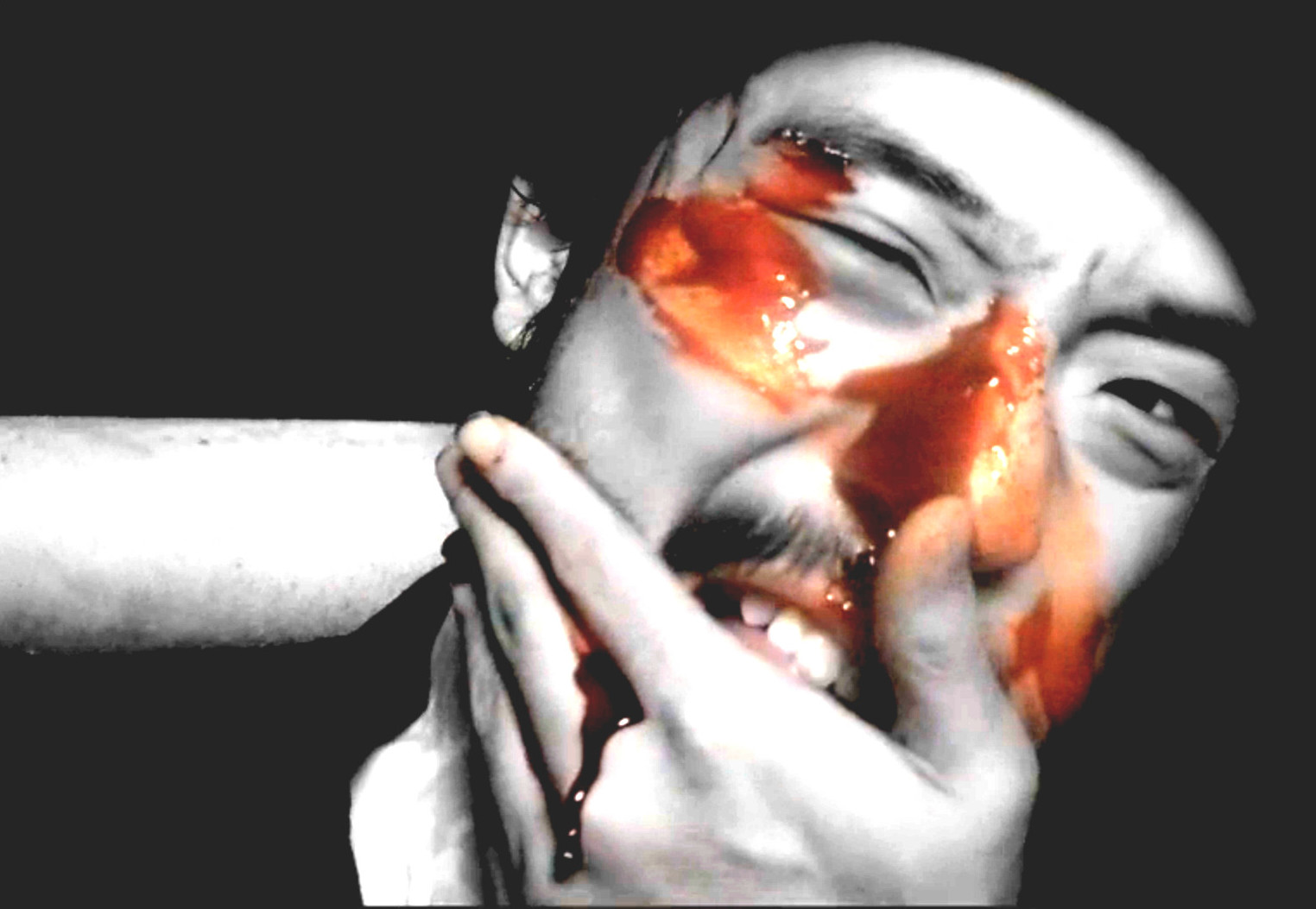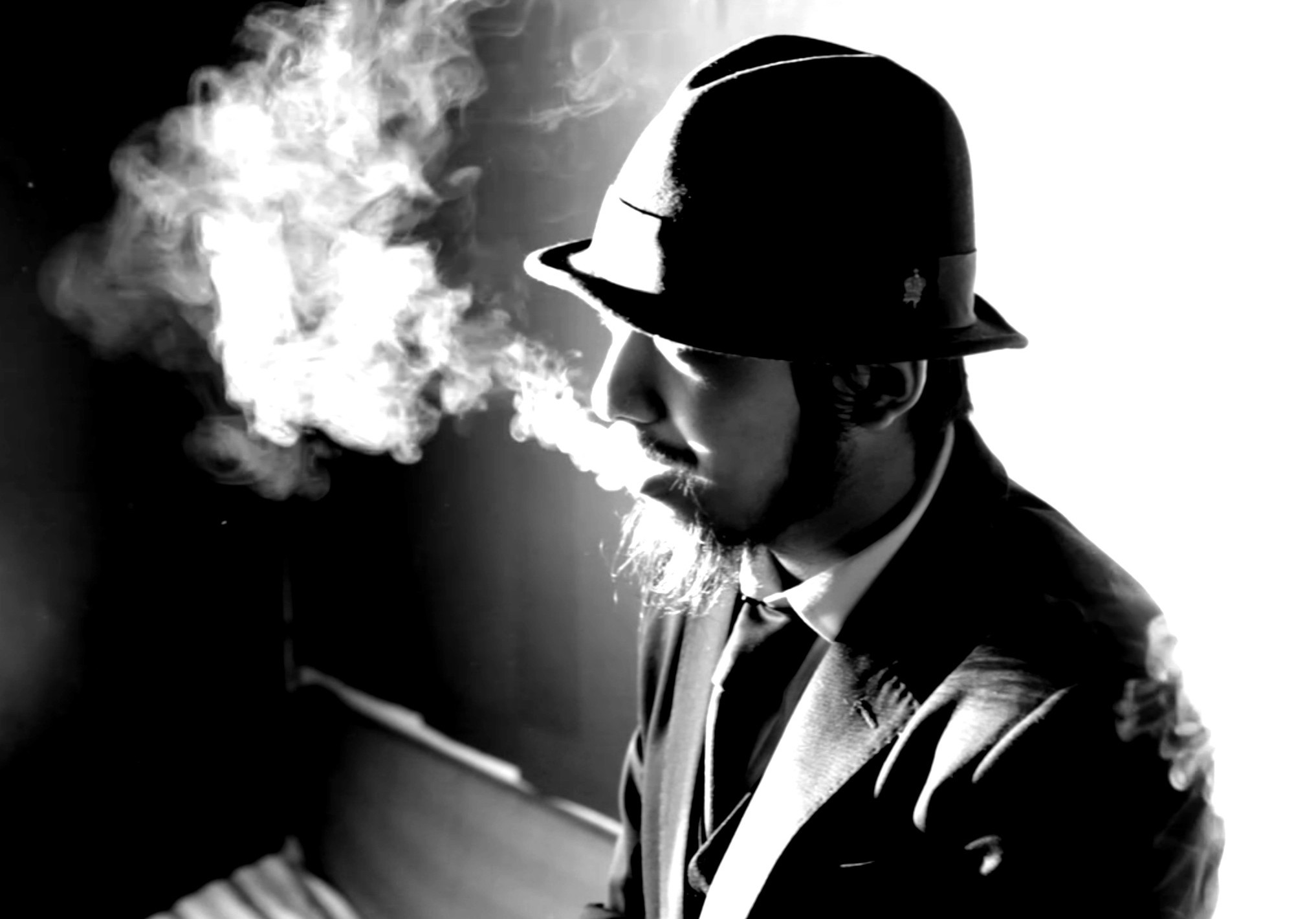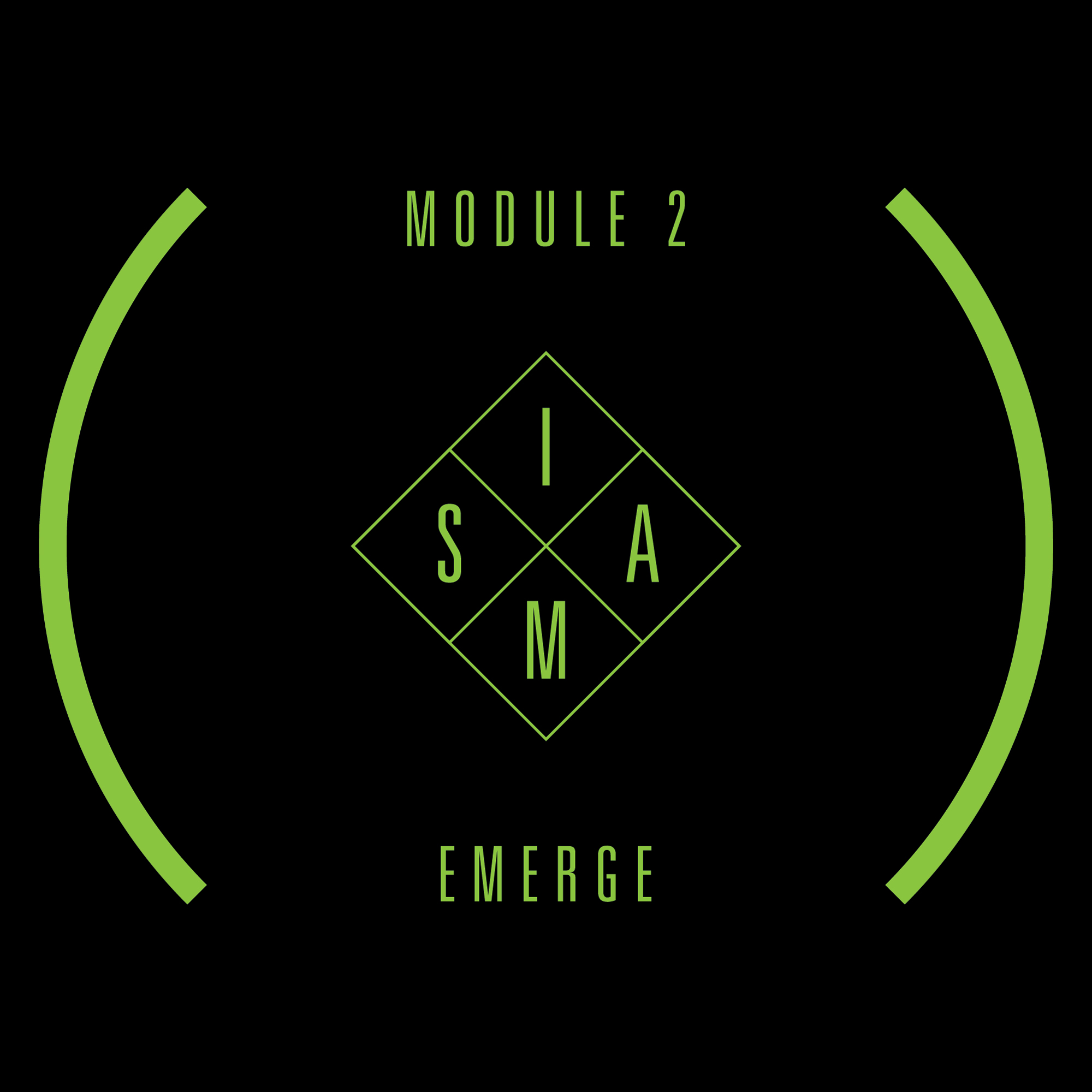采访:犯罪想法,北京朋克乐队
Fanzui Xiangfa Interview
By Pete DeMola, 2011年 9月 29日
《 中文采访 》
GUILIN, Sept 26—Beijing-based fastcore quintet Fanzui Xiangfa (Criminal Minds) has had a productive summer, dropping a new 7” record and embarking on a shoestring DIY tour across Central Europe. Vocalist Liu Liu breaks down the three-week trek, from getting stuck in the mud to weighing the implications for the world of Chinese punk rock.

pangbianr: Where did this tour take you?
Liu Liu: We went to five countries in three weeks: Germany, Poland, Switzerland, France and the Czech Republic. Rico, the drummer for SS20, organized the whole tour for us. We played mostly in squat houses—they’re amazing! In Europe, people find empty, condemned houses and come in to make some simple repairs. They paint graffiti and make each room for different things, like shows, kitchen, a sleeping room, bathrooms and so on.
pbr: Did you sleep there, too?
LL: Yes, of course, on mattresses. It was like a youth hostel, a room for ten people. Lots of bands wrote on the wall, including Green Day from 1998, I think, in Hanover.
pbr: That’s pretty cool. Do these squats have rules?
LL: If you eat, you have to clean your own dishes [pause]. Nothing else, really. Just help each other—people are very united.
In Poland, we played at a squat called Elba that had a boxing room because they have big problems with neo-Nazis, so they train people how to fight them.
There were also shows at simple bars—we didn’t play in big live houses. And then there were a few festivals, like the Fusion Festival (Lärz, Germany) and Vive Le Punk in Callac, France. There was one in Poland, and Fluff in the Czech Republic (Rokycany). That one was really muddy, but people didn’t care: everyone was throwing mud around. There were only two stages, but a lot of independent artists would have shows in tents, like acoustic and hip-hop artists. It was very community-oriented and had very nice vegetarian food, like Shanghainese rice.
pbr: What was the biggest crowd that you played to?
LL: The Fusion Festival, which is actually an underground event. The organizers didn’t use any government funds: every squat in Europe united together and organized this party—55,000 people at a Russian military airport in Lärz.
pbr: Really?
LL: Yeah, it was over three days long and at least eight stages. Maybe ten. The music never stopped. Reggae, electronic, punk and some folk, like a big techno party, but overall still supportive of punk bands.

pbr: Are that many people in Europe who are interested in squat culture?
LL: Many people are interested in music and squatting, but most of the people [at Fusion] just wanted to listen to music and party, like Woodstock. We slept outside in tents.
pbr: Did you check out any new bands?
LL: Some, but I don’t remember their names [pause]. I really liked Black Feet, an all-girl band from Sweden. [Editor’s note: another FZXF member intercedes to clarify that the band is called Black Feet, not “Wet Feet” as originally published. Also, Black Feet is not an all-female band, but FZXF did see a Swedish all-female band called Beyond Pink.]
pbr: What was your set like?
LL: We played at 8:30pm inside in a small warehouse called Shoebox which was about the size of D-22. Many people came to see us, but it started raining and then the room completely filled up. A lot of people liked us—many knew us from Facebook and MySpace and were requesting songs like “Beijing Hardcore.”
Adam and I were like, ‘What the fuck?’ [laughs].We played seventeen songs and a one-song encore, but overall, the experience was anxious. We had to move all of our gear ourselves. After the show, we realized that we forgot the merch, so we hurried to get it and people were still waiting thirty minutes later. They were very nice!
pbr: What’s it like being in band whose members are spread over multiple cities?
LL: We all went to Beijing and practiced for a month before the tour. When we arrived in Berlin, we had another rehearsal in Nothing’s [German hardcore band] practice room for two hours and played our first gig. It went well!

pbr: Did you meet any interesting characters?
LL: I met my Facebook fried Lisa in Germany for the first time. When we met in Berlin, I realized that she was stronger than you would think: she came from five hours by train from another city and was handicapped and used crutches. She really wanted to meet us. And then she came again to another city—we saw her at the Back to Future Festival in Glaubitz.
pbr: What was she like?
LL: She was 21-years-old, very smart and still in high school. Here in China, when I see people that can’t play sports or get around so easily, maybe I think that I need to take care of them. But she can take care of herself—she can pogo! We had a good time: Adam [bass], Lisa and I developed a strong friendship.
pbr: Anyone else?
LL: Rico [SS20] is very nice. We’d call him Uncle Rico because he’d treat us like an uncle—he’d make us breakfast every morning. He’d call us almost every day to ask us what we needed in terms of merch, like girly T-shirts. We sold out of those! He’d bring designs to factory to make more. We also sold out of our old CDs.
pbr: You have a new record out, right?
LL: It’s a six-song 7” that we recorded this past summer in Beijing. The cover art—a beautiful girl wearing a gas mask—was designed by a Chinese girl living in Sweden. It’s my first record with the band, so it’s a bit different than others. I wrote the lyrics for five songs, Adam handled one, with topics ranging from the DIY culture in China to environmental pollution and animal rights.
Fanzui Xiangfa s/t 7″ available from Genjing Records
pbr: Why the nuclear holocaust imagery?
LL: It’s just about this world and about how awful people can be. We have two points: people create lots of garbage, which is bad for the environment, and it’s also a statement on Japan, about how the recent tsunami exposed the Japanese government’s criminal activities.
pbr: Criminal activities?
LL: All of their hidden nuclear programs and their safety issues.
pbr: Okay. Any disasters of your own on tour?
LL: On the third day of Fusion, there was a big rain—we got soaked. Nevin [guitar] and I had to get breakfast and were completely soaked. We had to hang up our clothes in the van—it so stinky and muddy. And there was one show in Poland—the show was okay, but our van got stuck in the mud after it rained. A big truck came but broke the bumper and then the hitch broke afterwards [laughs]. So we called another company who came over with a forklift and got us out, but it was very funny—I’d never seen anything like this.

pbr: What did you guys eat?
LL: We’d eat vegetarian for about half of the time and vegan for the other half. Nevin, Mai Dian [guitar] and I are all vegetarians and Jonas [drums] is vegan, so none of us except for Adam care about meat. We’d buy food in these huge supermarkets, so it wasn’t a problem. We drove by a very famous German sausage store, but I forgot the name—someone pointed it out to me [laughs].
pbr: Which sub-cultures were you exposed to?
LL: We met so many vegans and vegetarians. And then there were the anti-fascists, the anti-sexist and anti-homophobic crowds.
We learned a lot from the anti-fascists. In China, we have a deep history with fascists, you know, especially regarding the war with Japan. I don’t know why we have some bands that play skinhead-type music, like Misandao, Life for Drinking and others here in China. I think, ‘They play the music, I don’t hate them.’ But in Germany, I learned a lot about how fascists really operate, not only with war, but about how they actually think. For example, at Back to the Future, we played in a small village at night and more than 20 neo-Nazis came to destroy it because we’re anti-fascists. They climbed the fence and went inside to fight. Some guards called the police and four later came and stopped them. In China, I only knew the skinhead music and fashion. But in Europe, I met real Nazis for the first time and I really hated it.
pbr: Do you think that if bands and their fans in China knew this, they’d drop the skinhead act?
LL: Yeah, I think so. They’re good people, but they just don’t know. If they did know, they’d probably give up on this shit music.
pbr: Have you changed as a result of this tour?
LL: I’ve been playing punk in China for about ten years, but recently, have been depressed because I think punk is dead—only the fake punks still exist in Beijing. The scene is bad: nobody listens to punk, so it can’t make money or make people interested in it. It’s really dead in China and it made me sad: I really wanted to give up. But in Europe, I saw so many people interested in rock and roll—in punk, in rockabilly, in so many other types of music. At one show in Berlin, in a squat called the Kobi Squat at night, I saw lots of punks at the bar, hundreds of them at one show—more than all of the punks in Beijing combined. It’s very developed.
They don’t make any money, either.
Sure, they live in squats, but they help each other out—they live together and get some money for the government. In Germany, if you have more than three dogs, the government will give you some money for their care.

pbr: Do people collect dogs just to get a government handout?
LL: They’re strays. They save them, so the government should give them money to buy dog food. But dog food in Europe is more expensive than vegetables.
pbr: What can you share with Chinese punks now as a result of this experience?
LL: I feel that punk is not dead, it will never die. Any kind of music already in this system can’t disappear, so I feel as if I have a new energy to play more. I started my old punk band again, Banana Peel. We went to Liuzhou last Saturday to play the Pangzhuan Festival.
pbr: How was that?
LL: It was good. There were lots of people, many bands. It’s a good city now for music. They just started to make shows three or four years ago, so the interest level is very high with many people at every show.
pbr: How do you see punk’s future in China?
LL: I can’t see a future. But, I mean, every band in China has to go to Europe. After that, they’ll know the reality. We should learn something more deeply than just showing off and being fashionable—Chinese punks need to experience more deep things inside.
pbr: Have you had a chance to talk with Demerit about their tour abroad?
LL: I haven’t, but I did see some pictures from their show with Poison Idea. They played some small shows. They don’t like playing small shows here, but they had to do it there, at small places with no stages. I bet when they come back, they will be even better. They’re already a great band. You know, a lot of Western people come to China to learn Chinese; we’re kind of the same, liuxuesheng, but learning about punk [laughs].
Fanzui Xiangfa’s new record is out now; buy it here. In related news, SS20 lands in China this autumn for a nationwide tour. More info here: SS20 2011 China Tour
北京本土Fastcore五人乐队犯罪想法(Criminal Minds, Fanzui Xiangfa)今年有一个非常忙碌的夏天,发行了一张最新7寸唱片,在欧洲小范围内进行DIY式巡演。乐队主唱“六六“接受pangbianr采访,他经过了三个星期的艰苦跋涉,结束了这次中国朋克摇滚的欧洲之旅。

旁边儿: 说说你们这次欧洲的巡演行程?
六六: 我们在三周内去过五个国家:德国,波兰,瑞士,法国和捷克。SS20乐队的鼓手Rico安排了我们这次所有行程,我们大部分在Squats (无人居住被遗弃的房子) 里表演——这简直太酷了!在欧洲人们很容易找到一些空置的,遭封闭的房子然后进行简单的装修,在这房间里涂鸦并且把每个房间都布置的与众不同,有表演的地方、厨房、卧室、浴室等等。
旁边儿: 所以你们也睡在那儿?
六六: 是的,当然。那就像是一个青年旅店,十人一个房间,很多乐队在墙上都有涂写,其中还包括1998年Green Day乐队的留下字迹,我猜是在汉诺威。
旁边儿: 这太棒了,住在这些地方有什么条例规定吗?
六六: 如果你在那边用餐,你必须清洗自己的餐具。其它倒没有什么,我们相互协助就像一家人,人们都团结一致。在波兰的时候,我们在一间叫做Elba的地方演出,那也有一个拳击场所,因为他们与新纳粹有很大问题,所以他们同时在那里训练如何与人搏斗。
有一些简单的演出酒吧,我们从未在较大的LIVE HOUSES里演出。 但有一些音乐节,像在德国Lärz 的Fusion 音乐节以及法国Callac 的Vive Le Punk音乐节。还有在波兰和捷克的Fluff,这个真的很脏,不过人们都并不在乎,所有人全身是泥。演出舞台只有两个,可是有许许多多的独立音乐人都在帐篷下进行演出,有一些不插电和Hip-Hop音乐人。很好的一个环境且有非常美味的素食食物,比如上海米饭。
旁边儿: 哪一场演出人最多?
六六: 德国的Fusion音乐节,然而事实上那是一个地下的活动,主办方没有任何政府的资金赞助,在欧洲每一个Squat场所我们都很团结一致,主办这次活动有55000人参加,同时那是俄罗斯在Lärz的军用机场。
旁边儿: 真的?
六六: 没错,整整三天,至少八个舞台,或许有十个,音乐从未停止。雷鬼,电子乐,朋克以及民谣,就像一个大的Party, 不过整体还是以朋克乐队为主。

旁边儿: 在欧洲有很多人都对Squat文化感兴趣吗?
六六: 很多喜欢音乐的人都对这个感兴趣,但大多数人(在Fusion音乐节)只是想听听音乐和PARTY, 像Woodstock音乐节一样,人们都会睡在帐篷里。
旁边儿: 有你喜欢的新乐队吗?
六六: 有一些,但我没法想起他们的名字,Umm… 我特别喜欢Black Feet, 是一支来自瑞典的纯女子乐队。
旁边儿: 你自己感觉怎么样?
六六: 我们晚上8点半在一个叫做Shoebox的小仓库里表演,就像北京D-22一样大,有许多人过来看我们演出,但不幸一开始就下起雨来,整个地儿都给泡了。人们似乎都很喜欢我们,他们都通过Facebook和Myspace知道我们,并要求现场演奏’Beijing Hardcore’. Adam和我都倍感惊异,‘怎么个情况?’(笑)。我们一共演奏了17首还包括一首返场。整个体验还是有点让人焦虑,因为演出完后我们自己得把所有设备装回去,且当时我们还落了一些东西在那边,然后匆忙赶回去取,他们人都非常好,足足等了我们半小时。
旁边儿: 乐队遍及多个城市,那么其他成员现在怎么样?
六六: 我们都回到了北京,在巡演前我们在一起排练了一个月,当我们到达柏林时,跟当地一支硬核朋克乐队Nothing的排练室进行了两小时的排练并在那进行了欧洲第一场演出,一切都很顺利。

旁边儿: 有没有遇到一些有趣的人?
六六: 我第一次见到了在Facebook的德国好友Lisa, 我们在柏林见面,我感觉她比你想像中要更坚强的多,她花了五小时坐火车从另一个城市来到柏林,而且她是一个身主拐杖的残疾人,但非常想跟我们见面,随后我们又在另一个城市见面了——在Glaubitz 的Back to the Future 音乐节。
旁边儿: 她看上去怎么样?
六六: 她年仅21岁,还在念中学,非常的聪明。在中国,我看到许多残疾人并不轻易去参加运动或者到处走走,或许我想他们需要人照顾。Lisa她完全可以照料自己,她甚至会在现场Pogo, 我们玩得特别高兴,Adam(贝司), Lisa和我已有着非常深厚的友谊。
旁边儿: 还有其他人吗?
六六: SS20乐队鼓手Rico是非常不错的家伙,我们大家都称他Rico 叔,因为他待我们就像叔叔一样——每天早上都会准备早餐,每天都会叫我们带上所需要的东西,比如像一些T恤,我们都售完了,他又会将设计好的图案送到工厂制作更多,且我们以前的唱片也都卖光了。
旁边儿: 你现在有新唱片发行对吗?
六六: 今年夏天我们在北京录制了一张含有6首歌的7寸黑胶,封面是一戴了防毒面具的漂亮姑娘,设计是由住在瑞典的中国女孩完成的。是我在这个乐队的第一张唱片,和其它的相比感觉有一点不一样。我完成了其中五首歌词,Adam写了一首,唱片的主题旨在中国DIY文化及环境污染和动物权益保护。
旁边儿: 为何喻为核毁灭性?
六六: 只是关于在这个世界上人们做些令人无法想象的事,我们有两个点:一是制造大量垃圾破坏环境的人,另一个是日本的描述——揭露日本政府有关对海啸的犯罪行经。
旁边儿: 犯罪行经?
六六: 所有他们隐藏的核计划以及安全问题。
旁边儿: 嗯,这次巡演你们有遇到什么麻烦吗?
六六: 在Fusion音乐节的第三天,一场大雨,我们全都淋了个落汤鸡,Nevin(吉他)和我去吃早点,但我们真的都湿透了。我们必须把衣服在货车里晾起来,真的又脏又臭。另外一个在波兰的演出,不过那场还好,只是我们的车被雨水后的污泥卡住了,完了一辆大卡过来撞坏了保险扛,因此我们呼叫了另一个公司把我们的车拖出来,这的确很有趣,我从没有过如此的经历。

旁边儿: 那你们都吃什么?
六六: 我们都是素食主义者,另外也有严格素食。Nevin, 麦颠(吉他)和我都是素食,鼓手Jonas是严格素食者,除了Adam我们没有人吃肉。我们一般都在大超市买一些食物,所以都不是什么问题。我们还路过一间很有名的德国香肠店,我忘了店名,有人指给我看(笑)。
旁边儿: 你有受什么样的亚文化影响?
六六: 我们遇到许许多多严格素食主义和素食者。然后还有反法西斯主义者,反性别及反对同性恋歧视者。
我们从反法西斯主义者中学习到很多,在国内,我们历经着深远的法西斯历史,你知道尤其抗日战争期间。我不明白为什么有那么多国内乐队玩SKINHEAD音乐,比如密三刀,Life for Drinking等其他国内乐队。我想他们只是玩音乐,但并没有讨厌他们,但是我在德国接触到很多有关法西斯主义者,不仅仅是战争,而是关于人们真实的想法。比如,在Back th the Future音乐节上,我们晚上在一个小村庄表演,因为我们是反法西斯,有近20个新纳粹份子过来搞破坏,他们翻过围墙来干架,有一些护卫者报警后阻止了骚乱发生。在国内我只知道SKINHEAD音乐和时髦,但是在欧洲不一样,我第一次碰上了真正的纳粹份子且极其厌恶它。
旁边儿: 假如乐队和他们歌迷知道是如此你觉得他们会放弃吗?
六六: 我想是的,他们人都很不错,只是都不知道,如果确实了解那是什么,他们可能就会停止继续这种狗屎音乐。
旁边儿: 通过这次巡演你有什么感想?
六六: 我在中国玩音乐大概有十年了,最近对中国朋克音乐感到有些沮丧,我想已经没有朋克了,当然有伪朋克一直存在北京,如此场景真的很糟糕,没有人听朋克乐,因为那并不能挣钱或者让人们感到有趣。在中国朋克真的没了,这令人很失落,我也特别想放弃。在欧洲我们能遇见许许多多的人都非常喜欢摇滚乐,朋克,山地摇滚等各种不同类型音乐。有一次在柏林的现场,我们晚上去了当地的一个叫做KOBI的Squat, 能看到许许多多朋克乐迷在玩儿,我想当晚到场的乐迷都超过所有的北京朋克,真的很成熟。
他们同样挣不到钱,当然他们也住在一些Squats里, 大家都住在一起且互相协助,同时也会得到政府的资助。在德国假如你养狗超过三条,政府就会给一些钱资助他们。

旁边儿: 有人收集狗获得政府资助吗?
六六: 他们是些土狗,所以会有人领养它们,政府应该支付它们狗粮费用,但是在欧洲狗粮比蔬菜都贵。
旁边儿: 关于这次巡演经历,能否跟国内朋克乐迷分享一下?
六六: 我觉得朋克并没有死,也将永不会死。任何的音乐体系都不会消失,我会为我的音乐带来更多新鲜的血液,我重新开始了我的OLD SCHOOL朋克乐队 Banana Peel.我们上周六刚去了柳州参加庞庄音乐节。
旁边儿: 怎么样?
六六: 挺不错的,有很多人过去玩,也有许多乐队。现在算是具有很好音乐氛围的城市,他们只是在三四年前才开始主办活动,现在越来越多人有兴趣关注。
旁边儿: 你对中国未来的朋克乐有什么看法?
六六: 我不知道未来会有什么发生。我想所有中国的乐队应该值得去欧洲,之后他们便会知道更真实的存在,我们该学习除了卖弄和时髦之外的东西,中国朋克需要更深的内心所在。
六六: 我还没有,我有看到他们与Poison Idea同台演出的照片。他们在一些小场地演出,他们在这并不喜欢小场地演出,但在那边也同样是没舞台的小场地,我确信当他们回来后会更好,他们已经是一支非常成功的乐队。现在许多外国人在中国学习中文,我们也一样是留学生,可我们去了解朋克(哈)。
犯罪想法乐队最新唱片已经开始发售,在这里购买。另外,德国硬核乐队SS20将抵达中国进行秋季巡演,更多详情:SS20 2011 China Tour









Really Asians should be more informed about Nazism and fascism. Like some ppl wear Nazi regalia because they think it’s cool. Rock stars wear SS uniforms and no one bats an eyelash. The level of ignorance is appalling. Get an education, ppl.
Ditto with Europe – they should learn about Imperial Japan during WW2. Some of them cry that America was too harsh on Japan without taking into account Japanese war atrocities. I’m not being anti-Japanese, I’m just angry that these Western ignoramuses totally discount the rest of Asia as if we didn’t matter at all.